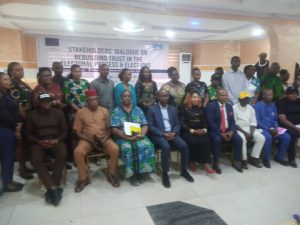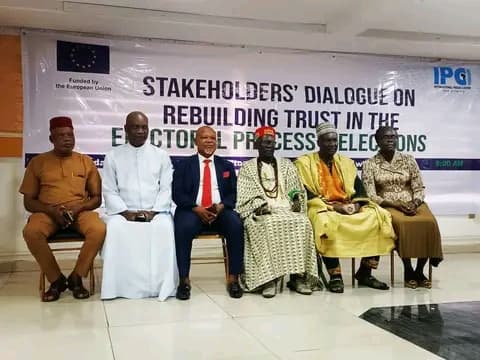Lawrence Nwimo, Awka
Former Resident Electoral Commissioner, Independent National Electoral Commission (INEC) in Anambra State, Dr Nkwachukwu Orji, has advocated for an independent audit of elections at national and subnational levels to regain the trust of voters in Nigeria.
Orji made the recommendation in Awka, Thursday, during a One-Day Stakeholders’ Dialogue on Rebuilding Trust in the Electoral Process.
The event was organised by the International Press Centre (IPC), Lagos-Nigeria, under the component 4 (Support to media) of the European Union Support to Democratic Governance in Nigeria- Phase 2 (EUSDGN II) project and attracted multiple stakeholders including civil society organisations, traditional institutions, trade unions, journalists and other media professionals in the state.

Delivering the Lead Paper entitled: “Rebuilding Trust in the Electoral Processes and Institutions: Perspectives on Role of Key Stakeholders,” Orji identified fraud, irregularities, lack of transparency, disenfranchisement, and misinformation as acts that violate trust in the electoral system of Nigeria.
He also said poor voter experience, organisational flaws, questionable handling of different electoral processes, unprofessional conduct of officials contribute to decline in Nigerians’ trust of electoral process.
Orji expressed worry over the decline in public confidence in Nigeria elections. According to him, successive surveys have consistently shown that citizens’ trust in the electoral process has plummeted, resulting in widespread voter apathy across the country.
He said time has come for the country to adopt the external review and auditing of every election to ensure that the integrity and transparency of the electoral process are maintained.
He said the move would help prevent electoral malpractices, promote accountability, and strengthen the country’s democracy, ultimately leading to more credible and peaceful elections.
“External audit of elections has become necessary. Essentially, there are two ways elections are audited. At the internal level, INEC has what it calls a post election audit. That process runs from local government to the national level after every election. It is usually an elaborate exercise that involves both the permanent and ad hoc staff and other individuals that participated in the election.
“We must move beyond internal audits, which some civil societies are advocating for. Instead, we need an external and independent audit, which can be achieved by convening a panel of experts to review the electoral process or by empowering National Assembly committees to oversee elections. These committees can utilise their legislative oversight powers to ensure transparency and accountability, ultimately determining if the allocated funds for elections are being utilised efficiently.
“The essence of the oversight is that it helps us to make sense which is one of the mechanisms of building trust in a democratic process,” he said.
Orji added that since election is a multi-stakeholder affair, INEC and other stakeholders must begin rebuilding the people’s trust in the process to strengthen the country’s democracy.
Contributing, INEC REC in Anambra State, Dr Elizabeth Agwu, reminded the dangers of trading votes for money during elections, noting that it will continue to undermine the integrity of Nigeria’s democracy and hinder the country’s progress if left unchecked.
She encouraged citizens to take the initiative to verify the credibility of information, ensuring its accuracy and reliability before use. She stressed the importance of managing influence by adhering to the rule of law and promoting a culture of obedience to law and upholding its principles.
A former Resident Electoral Commissioner (REC) in Enugu State, Dr. Emeka Ononamadu, urged stakeholders in the electoral process to look deep for the root causes of the widespread disillusionment with elections, emphasising that elections are the cornerstone of every nation.
Ononamadu who chaired the event encouraged stakeholders to take an introspective look at the electoral process, identify areas of improvement, and work collaboratively to address challenges and restore trust in the system.
Speaking on behalf of Traditional Rulers in Anambra State, the Secretary General of Anambra Traditional Rulers Council, HRH Igwe Pius Omachonu, urged relevant federal agencies to live up to their responsibility of orienting the public on good electoral practices and the need for active participation in the country’s democratic processes.
Chairman Nigeria Union of Journalists (NUJ) Anambra State Council, Dr. Odogwu Emeka Odogwu, urged the electoral umpire to consider increased collaboration with journalists to foster transparency, accountability, and credibility in the electoral process. He said the partnership would enable journalists to provide accurate and unbiased reporting, helping to build trust among citizens and ensuring the integrity of elections.
Chairman Joint National Association of Persons with Disabilities (JONAPWD) Anambra State Chapter, Comrade Ugochukwu Okeke, called for priority inclusion of persons with disabilities (PWDs) in the electoral processes. He also called for the removal of barriers limiting the disabled community from participating in party and other political activities.
Earlier, Executive Director of IPC, Mr. Lanre Arogundade, said the dialogue was targeted at seeking further reforms aimed at strengthening the electoral system through potential amendments to the Constitution and the Electoral Act of 2022.
Represented by the IPC Programme Manager, Stella Nwofia, Arogundade noted that managing elections in Nigeria remained a complex task that would be difficult to handle by INEC alone, hence the need for collaborative approach involving all sectors of society.
“Our collective aim is to gather insights from all geopolitical zones in Nigeria, focusing on the urgent need to rebuild trust and foster collaboration that will improve future elections especially following the complexities that arose during the 2023 general elections.
“As we embark on this initiative under Component 4: Support to Media of the European Union Support to Democratic Governance in Nigeria – Phase 2 (EUSDGN II), implemented by the International Press Centre alongside the Centre for Media and Society (CEMESO), we recognise that every stakeholder’s role in the electoral process is vital,” he said.

